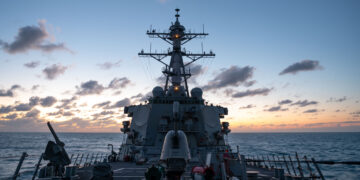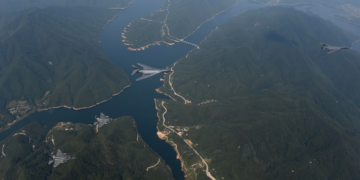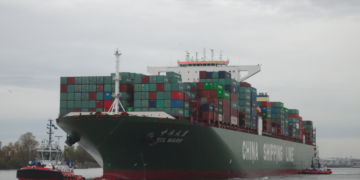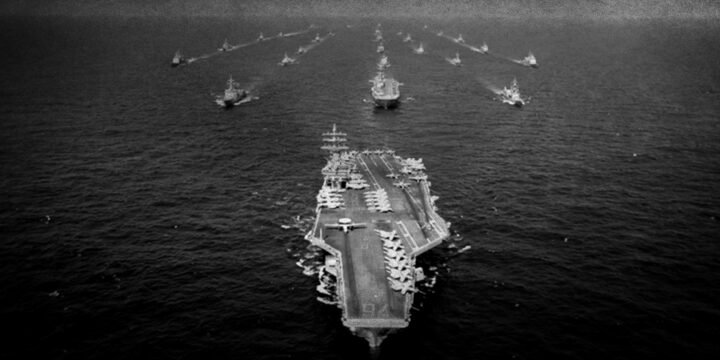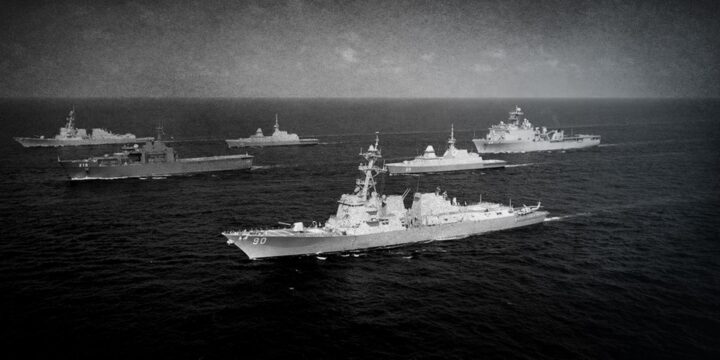September 15, 2025
Will the U.S. go to war over Taiwan?
Interpreting the results of an expert survey
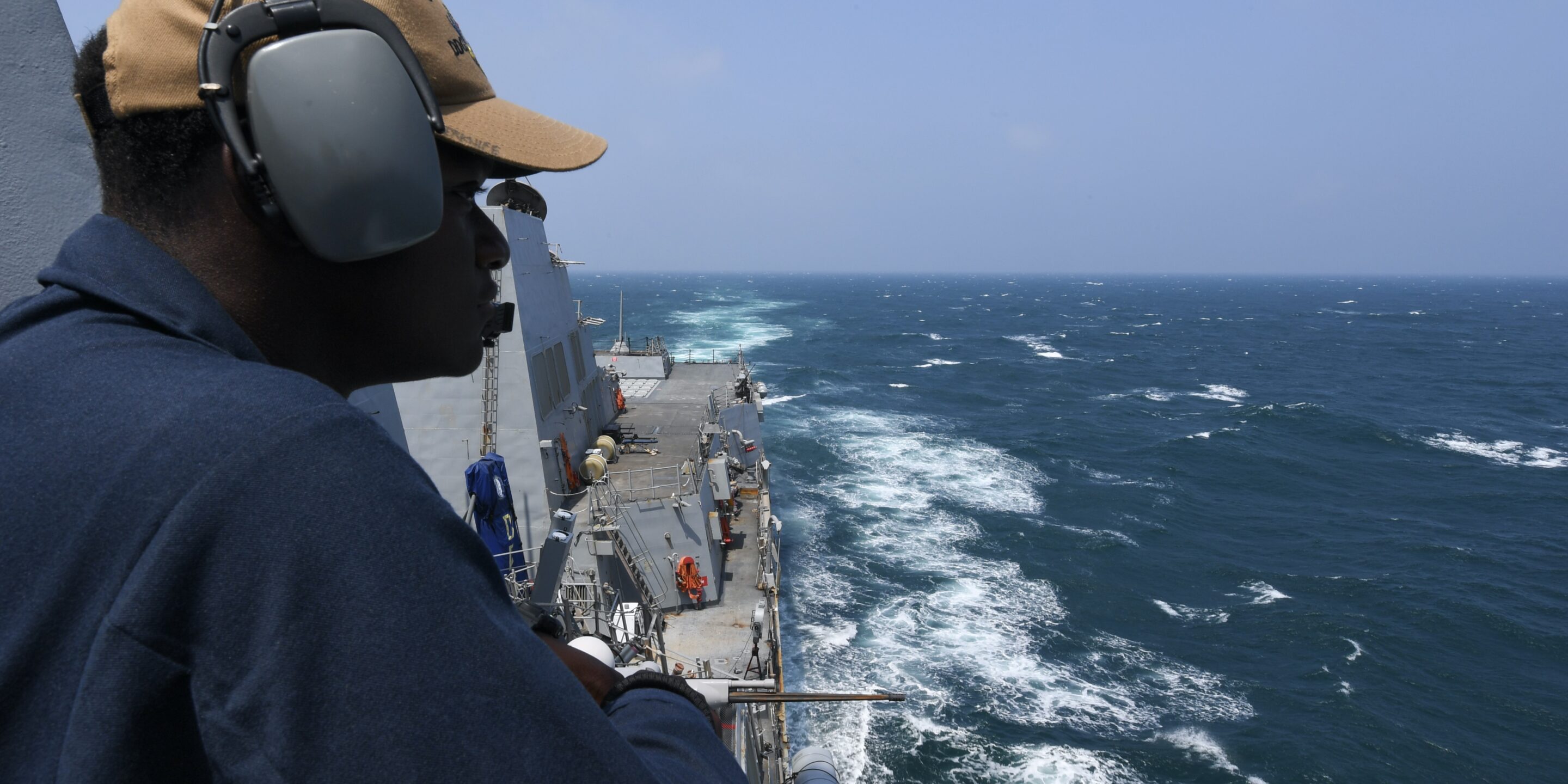
Key points
- The small island of Taiwan is often at the center of U.S. foreign policy discourse. This is thanks to the threat of a Chinese invasion and fears over a resulting loss of U.S. military and economic power in the region.
- A recent survey by Defense Priorities shows there is substantial disagreement among experts as to how the United States should and would respond to a Taiwan conflict. This suggests the U.S. policy of strategic ambiguity toward Taiwan is working.
- The experts surveyed largely agreed that China is unlikely to invade Taiwan, a departure from political and military leaders who have inflated the possibility. They also tended to agree that China is unlikely to strike U.S. military bases in East Asia ahead of a Taiwan invasion, which would grant U.S. leaders flexibility in how they respond to this scenario.
- These experts are divided, however, on what that response should look like. Some say the United States should use direct military force in Taiwan while others argue it should only send military aid. Very few think the U.S. should stay out completely.
- Even as they acknowledge that a successful seizure of Taiwan would not offer China significant military or economic benefits and recognize the enormous risks and costs to the United States of entering a Taiwan conflict, some experts continue to support a U.S. intervention. This tension is perhaps best explained by a lingering attachment to the pursuit of U.S. hegemony.
Though it lies 7,000 miles from the United States, Taiwan is often at the center of U.S. foreign policy discourse.
Taiwan is not a U.S. ally but it has a unique and close security relationship with the United States. Formally, the United States maintains a position of strategic ambiguity when it comes to Taiwan’s defense, neither committing to defend the island nor saying it will not do so.1“Strategic Ambiguity Toward Taiwan,” Council on Foreign Relations, June 8, 2022, https://education.cfr.org/teach/mini-simulation/strategic-ambiguity-toward-taiwan. Yet a U.S. defense of Taiwan is defined as the “pacing scenario” on which Pentagon military planning, budgeting, and training is focused.2Terri Moon Cronk, “Testimony: DOD Is Laser Focused on China Pacing Challenge, Meeting Our Commitments Under the Taiwan Relations Act,” DOD News, U.S. Department of Defense, December 8, 2021, https://www.defense.gov/News/News-Stories/Article/Article/2867003/testimony-dod-is-laser-focused-on-china-pacing-challenge-meeting-our-commitment/. Congressional hearings invariably find their way to the question of Taiwan, what the United States is doing to support the island, and how ready military forces are to support its defense in a crisis.
Among U.S.-based security and defense experts, however, there is much disagreement over whether, when, and how China might move against Taiwan and how a U.S. president would respond if it did. Some policymakers assert that a war over Taiwan is imminent, as Secretary of Defense Pete Hegseth did in his address at the Shangri-La Dialogue.3“Remarks by Secretary of Defense Pete Hegseth at the 2025 Shangri-La Dialogue in Singapore (As Delivered),” U.S. Department of Defense, May 31, 2025, https://www.defense.gov/News/Speeches/Speech/Article/4202494/remarks-by-secretary-of-defense-pete-hegseth-at-the-2025-shangri-la-dialogue-in/. Others are less certain but feel sure that if China were to attack its small neighbor, the United States would intervene.
Despite or even because of these differences, an analysis of expert opinion focused on Taiwan’s future security and the evolution of U.S. policy toward the island is useful. Experts can offer nuanced insight and often have specialized knowledge, language skills, and experience they can draw upon. Even where experts are uncertain or disagree, an analysis of their judgments can reveal how they weigh different information, what they find credible, and what assumptions they accept or challenge.4Christian von Soest, “Why Do We Speak to Experts? Reviving the Strength of the Expert Interview Method,” in Perspectives on Politics, eds. Ana Arjona and Wendy Pearlman (Cambridge: Cambridge University Press, 2023), vol. 21: 277–287, https://www.cambridge.org/core/journals/perspectives-on-politics/article/why-do-we-speak-to-experts-reviving-the-strength-of-the-expert-interview-method/45E710F27CEC6E739B015E10A161E140.
Leveraging these advantages, this paper presents the results of a Taiwan-focused survey of 51 experts conducted in early 2025. Respondents answered questions about the likelihood of a Chinese attack on Taiwan, how the United States might respond, how the United States should respond, and how the outcome of a war over Taiwan might affect the United States and its allies. In addition to presenting the results, the paper discusses implications for policymakers and raises questions that might be considered in future research.
The results offer a number of important insights. Among them is that there is widespread disagreement as to how the United States would and should respond to a Chinese attack on Taiwan. In other words, strategic ambiguity seems to be working. Experts who responded to our survey believe that U.S. national security officials would have room for discretion if China were to attack Taiwan, and no one—in the United States or in Asia—should assume that a U.S. military response is assured.
How did we find and survey experts?
Expert surveys are unique in the world of public opinion research. They are not representative of the general public and because they draw from a specialized population, their samples tend to be smaller than polls of randomly selected individuals. However, they can be representative of expert opinion on specific topics. This survey looks specifically at expert opinion on the topics of U.S. national security and military strategy, Chinese security especially as it relates to Taiwan, and cross-strait relations.
Our survey was sent by email to 162 possible respondents in late January 2025 after the inauguration of Donald Trump. We gave respondents about two months to complete the survey and sent periodic reminders during this time. Our pool of experts was compiled from a review of three sources: (1) U.S.-China Economic and Security Review Commission testimony conducted between 2019 and 2023 (experts with a narrow focus on economics or technology were excluded to leave only those with military or defense expertise); (2) articles published in the print or online editions of Foreign Affairs and leading peer-reviewed international security journal articles between 2019 and 2024 on U.S. strategy in Asia, Chinese military and security questions, cross-strait relations, and other related issues; (3) the China or Asian security programs at top Washington, DC think tanks and U.S. universities.
Only U.S.-based experts were included in our survey but the resulting sample was diverse with regard to political and foreign policy viewpoints, government experience, gender, and age. Of the 162 experts we contacted, 51 replied for a response rate of about 31 percent, which is just above the average survey response rate of 20–30 percent.5Kinga Edwards, “What is a Good Response Rate for a Survey?” SurveyLab, June 6, 2025, https://www.surveylab.com/blog/what-is-a-good-response-rate-for-a-survey/. The survey was anonymous, so we do not report demographic or other identifying information on the respondents.
Since the sample is too small for advanced statistical analysis, we present the results descriptively, highlighting key trends. Though the experts in our sample agree on some questions, there was substantial disagreement on key issues such as whether seizing Taiwan would benefit China in significant ways, how the United States should respond to a Chinese attack on Taiwan, and how likely China would be to achieve its military objectives were it to launch an attack on the island.
The remainder of the paper is organized around the topics our survey questions addressed. The full survey is included as an appendix.
Analyzing the survey results
Speculation about the timing and likelihood of a Chinese attack on Taiwan is a cottage industry in Washington, DC. Secretary Hegseth was only the latest U.S. military official to proclaim that a Chinese invasion is imminent. The former commander of INDOPACOM Phil Davidson, for example, opened what came to be called the “Davidson Window” by noting that Xi Jinping had ordered his military to be ready to carry out a seizure of Taiwan by 2027.6Noah Robertson, “How DC became obsessed with a potential 2027 Chinese invasion of Taiwan,” Defense News, May 7, 2024, https://www.defensenews.com/pentagon/2024/05/07/how-dc-became-obsessed-with-a-potential-2027-chinese-invasion-of-taiwan/. Air Force General Mike Minihan told his staff that he expected war in 2025.7Audrey Decker, “Air Force general defends incendiary memo but says ‘war is not inevitable,’” Defense One, September 20, 2023, https://www.defenseone.com/threats/2023/09/air-force-general-defends-incendiary-memo-says-war-not-inevitable/390467/.
In contrast, our survey respondents did not believe that a Chinese invasion of Taiwan was “imminent” or, in fact, likely at all. None of the experts thought a Chinese attack on Taiwan was “very likely.” Instead, about 85 percent classified a Chinese invasion of Taiwan as unlikely or very unlikely.
Likelihood of a Chinese invasion of Taiwan in the next five years
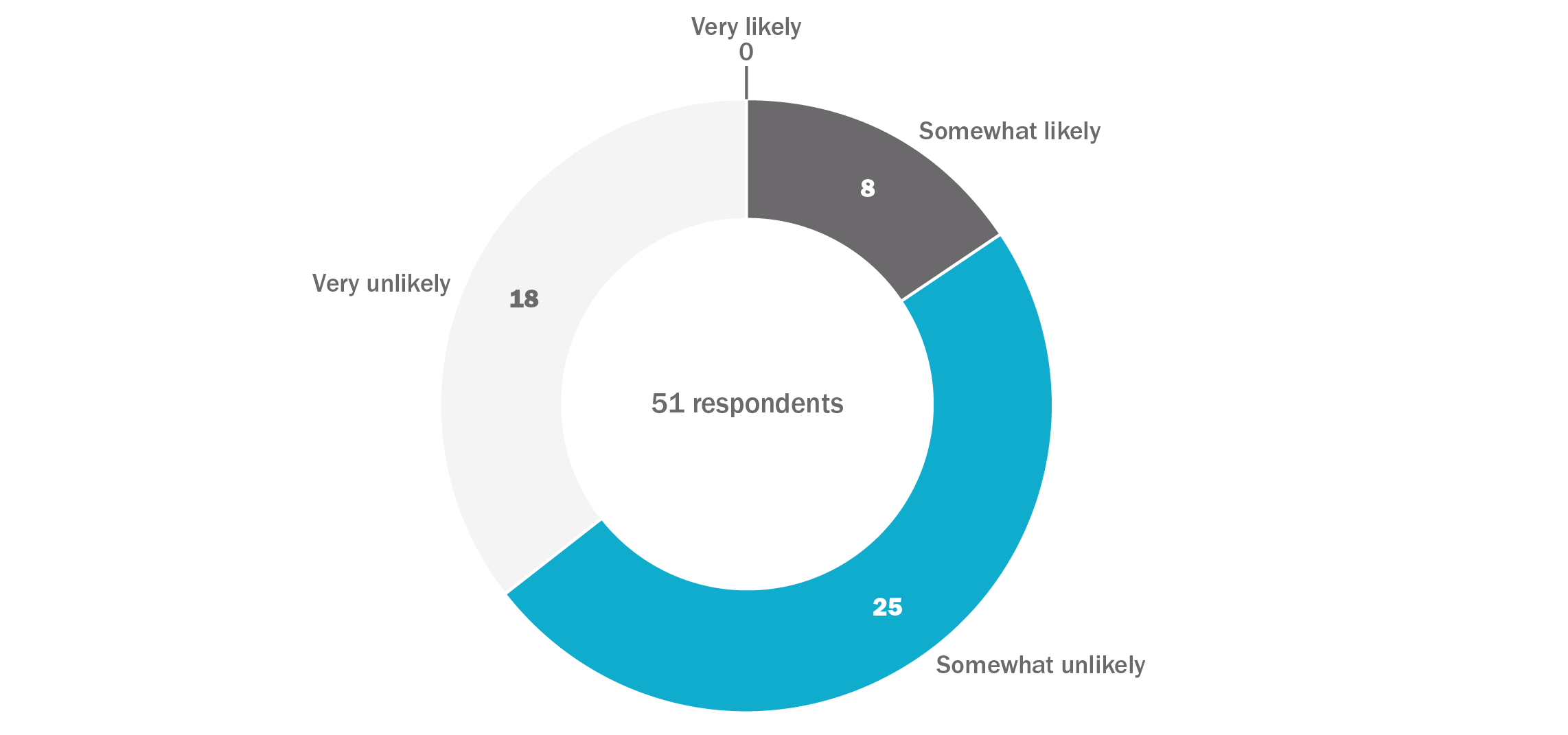
In part, this divergence may reflect the disparate perspectives and motivations of military commanders and foreign policy scholars. Military leaders have incentives for threat inflation: they need to press Congress for money and heighten the preparedness of their forces, with urgency essential to these objectives. Experts and scholars of foreign policy have less incentive to hype the dangers of an invasion. They may also look at different types of evidence and have a better sense of long-term trends, characteristics of the Chinese political culture, and stabilizing factors outside the military domain.
This divergence raises an important question for policymakers. Given the expert consensus that an attack on Taiwan is not looming, should it occupy the place of central importance in U.S. foreign policy that it does today? The answer depends a lot on how high the costs to the United States of a Chinese invasion would be, as even a low probability event with extremely high costs should receive significant attention.
Wargames conducted inside and outside the government have tried to map what an attack on Taiwan by China would look like. These simulations typically arrive at a similar or at least overlapping set of expectations about likely Chinese strategy. According to conventional assessments, an invasion is expected to start with missile salvos and cyberattacks aimed at the island. Most scenarios also anticipate that Beijing would strike U.S. bases and airfields in Japan and Guam early in a conflict, hoping to disable or limit the U.S. response before it begins.8The most prominent recent example is Mark F. Cancian, Matthew Cancian, and Eric Heginbotham, “The First Battle of the Next War: Wargaming a Chinese Invasion of Taiwan,” Center for Strategic and International Studies, January 9, 2023,
https://www.csis.org/analysis/first-battle-next-war-wargaming-chinese-invasion-taiwan; see also Stacie Pettyjohn, Becca Wasser, and Chris Dougherty, “Dangerous Straits: Wargaming a Future Conflict Over Taiwan,” Center for a New American Security, June 15, 2022, https://www.cnas.org/publications/reports/dangerous-straits-wargaming-a-future-conflict-over-taiwans.
Those who adopt this view, assuming that China would act quickly to attack U.S. bases in the Indo-Pacific, see the space for policymaker flexibility when it comes to a U.S. response to a Chinese invasion of Taiwan as very limited. Once U.S. assets are attacked, it becomes hard for the United States to remain uninvolved.
Expert respondents in our survey, however, were less sure about the likelihood of preemptive attacks on U.S. targets. Only about 30 percent expected that it was likely or very likely that Beijing would target U.S. bases in Japan to forestall a U.S. response, while 20 percent thought the same about a Chinese attack on U.S. bases in Guam.
Likelihood of China preemptively striking U.S. bases in Japan or Guam

This is an important finding for what it suggests about the space for policymaker discretion. If, as our expert respondents suggest, the likelihood of a preemptive Chinese attack is low, policymakers may have more room to maneuver when responding to a potential Chinese invasion. Absent a Chinese attack on U.S. bases, policymakers could weigh the costs and benefits of a U.S. intervention and even see how the early days of the war unfold before committing the United States. This time would also increase the influence that individual policymakers might have on the final intervention decision.
To examine this issue more deeply, we asked respondents to assess the likelihood of three possible U.S. responses, assuming China attacked Taiwan and did not immediately strike U.S. bases in Japan or Guam: a direct military intervention involving U.S. troops, a U.S. provision of military assistance only with no troops, and no response.9Jennifer Kavanagh and Stephen Wertheim, “The Taiwan Fixation,” Foreign Affairs, September/October 2025, https://www.foreignaffairs.com/taiwan/taiwan-fixation-kavanagh-wertheim.
The results show significant disagreement about how the United States would respond if Taiwan were attacked. In other words: strategic ambiguity seems to be working. If even U.S.-based experts, many of whom have served in America’s national security bureaucracy, are not sure whether the United States would send military forces to defend Taiwan, then certainly U.S. allies in the region and China itself cannot be sure.
Likelihood of U.S. responses to a Chinese invasion of Taiwan if U.S. bases are not attacked
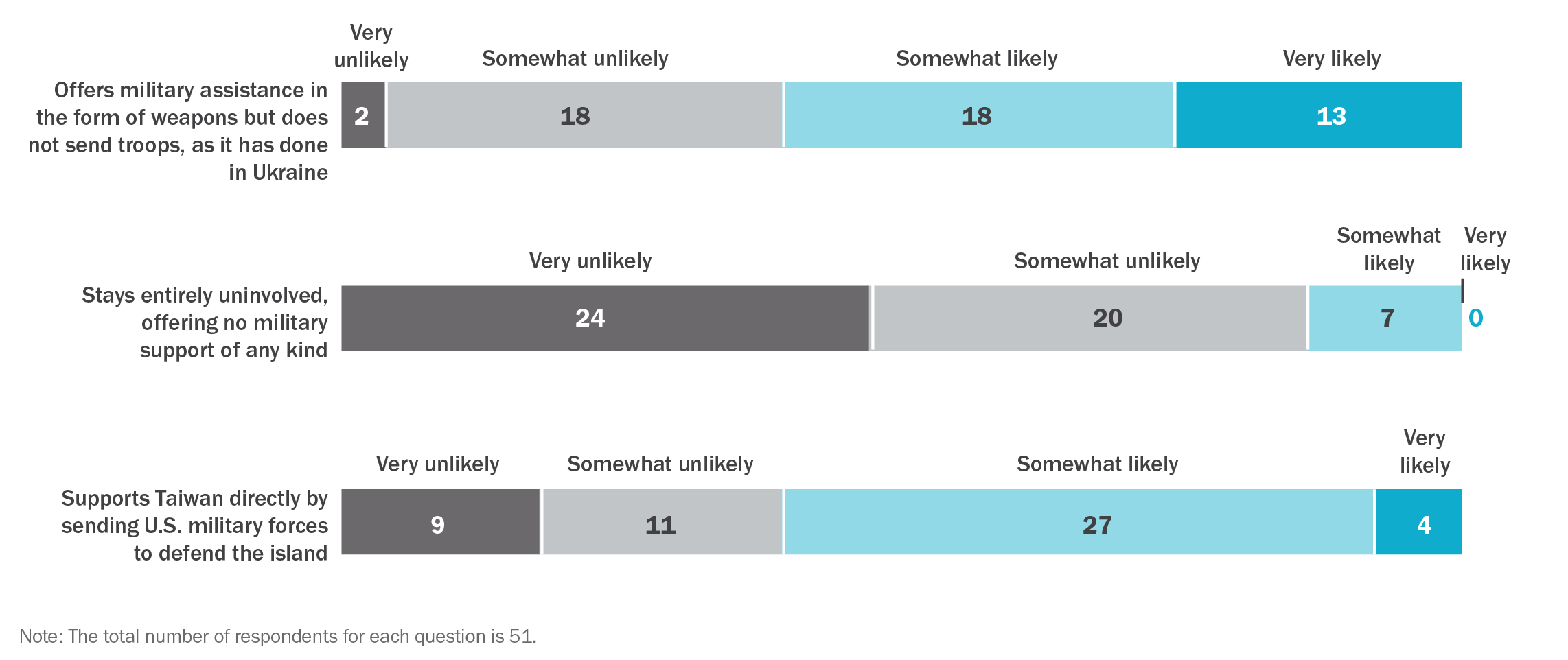
Experts fell into four groups. Very few respondents thought the United States would avoid all involvement. This small number, the “avoiders” (red), expected the U.S. would be unlikely or very unlikely to send troops or offer military assistance. They were confident the United States would stay uninvolved in the conflict.
Almost 90 percent of experts disagreed, finding it unlikely or very unlikely that the United States would simply stay on the sidelines. These respondents were more evenly split across the three remaining groups, the “interveners,” the “assistors,” and the “undecideds.”
- The “interveners” identified a direct U.S. military intervention as likely or very likely and saw a U.S. response involving only military assistance as unlikely. This group was the most confident of a strong and direct U.S. response (blue).
- The “assistors” reported the opposite, that U.S. military assistance was somewhat or very likely but a response involving U.S. military forces defending the island was not. This group seemed confident the United States would offer Taiwan some aid but skeptical this would include troops confronting Chinese forces (light gray).
- The “undecideds” expected that both direct military intervention and a response involving only U.S. military assistance were somewhat or very likely. In other words, this last group expected the United States to respond but was not sure what that response would look like (dark gray).
For observers in the Indo-Pacific region eager for the U.S. to defend Taiwan, the results offer both good and bad news. On the one hand, the experts who responded to our survey assess that the United States is likely to take some kind of action if Taiwan is attacked by China. On the other hand, there is little confidence that this support will include the direct involvement of U.S. military personnel to defend the island.
Charting the experts on U.S. responses to a Taiwan invasion

Instead, most experts appear to see a “Ukraine model” for Taiwan as equally likely as a full U.S. military intervention. This would involve the United States providing military assistance primarily in the form of weapons and possibly intelligence to help Taiwan defend itself without sending U.S. military forces to directly defend the island. Such an approach would be much harder for Taiwan relative to Ukraine due to its being an island, which makes supplying forces there far more challenging. This would leave Taiwan carrying most of the burden for its frontline defense.
Though our experts disagreed on how the U.S. would respond if China attacked Taiwan, there was more consensus when it came to what kinds of allied support the United States might receive if it did end up sending military forces to defend the island. The United States, they think, won’t receive much allied help.
U.S. military planners hope for significant allied assistance to augment any U.S. contribution to Taiwan’s defense. The Pentagon is counting on Japan to offer use of its bases for offensive operations and to contribute ships and submarines.10Austyn Sutton, “The United States Needs Japan in a Fight for Taiwan,” Proceedings 150, no. 10 (October 2024), https://www.usni.org/magazines/proceedings/2024/october/united-states-needs-japan-fight-taiwan. Washington is also hoping Australia will support U.S. operations in important ways. One of the main drivers from the U.S. perspective of AUKUS—the defense agreement between the United States, Australia, and the UK—was to build Australia’s capabilities and increase the support it could provide in a Taiwan crisis. Military planners hope all the training they do with the Philippines will pay off in a regional contingency as well.11Evan A. Feigenbaum, “Beneath the Mateship, a Quiet Crisis Is Brewing in the U.S.-Australia Alliance,” Carnegie Endowment for International Peace, June 23, 2025, https://carnegieendowment.org/posts/2025/06/us-australia-alliance-quiet-crisis?lang=en.
Experts who responded to our survey do not expect this level of allied support to materialize. Out of 44 respondents, only 20 (less than half) expected the United States to receive support from regional allies. When asked to identify which allies might offer support, all 20 included Japan and 15 included Australia as well. The Philippines was named by only four respondents, the United Kingdom by three, and South Korea by just one.
Of course, in the event that a war does break out, how allied governments respond will depend on the specific events leading up to the war’s onset—for example, who is seen as the aggressor or provocateur—as well as each country’s domestic politics and perhaps the nature of U.S. involvement or pressure placed on partners. Still, our survey should be a warning to military planners against assuming they will have a large military coalition to fight Taiwan, no matter how much they invest or train. Much more likely, according to expert opinion, is that the United States ends up fighting alone.
Likelihood that U.S. regional allies contribute troops to a U.S. defense of Taiwan
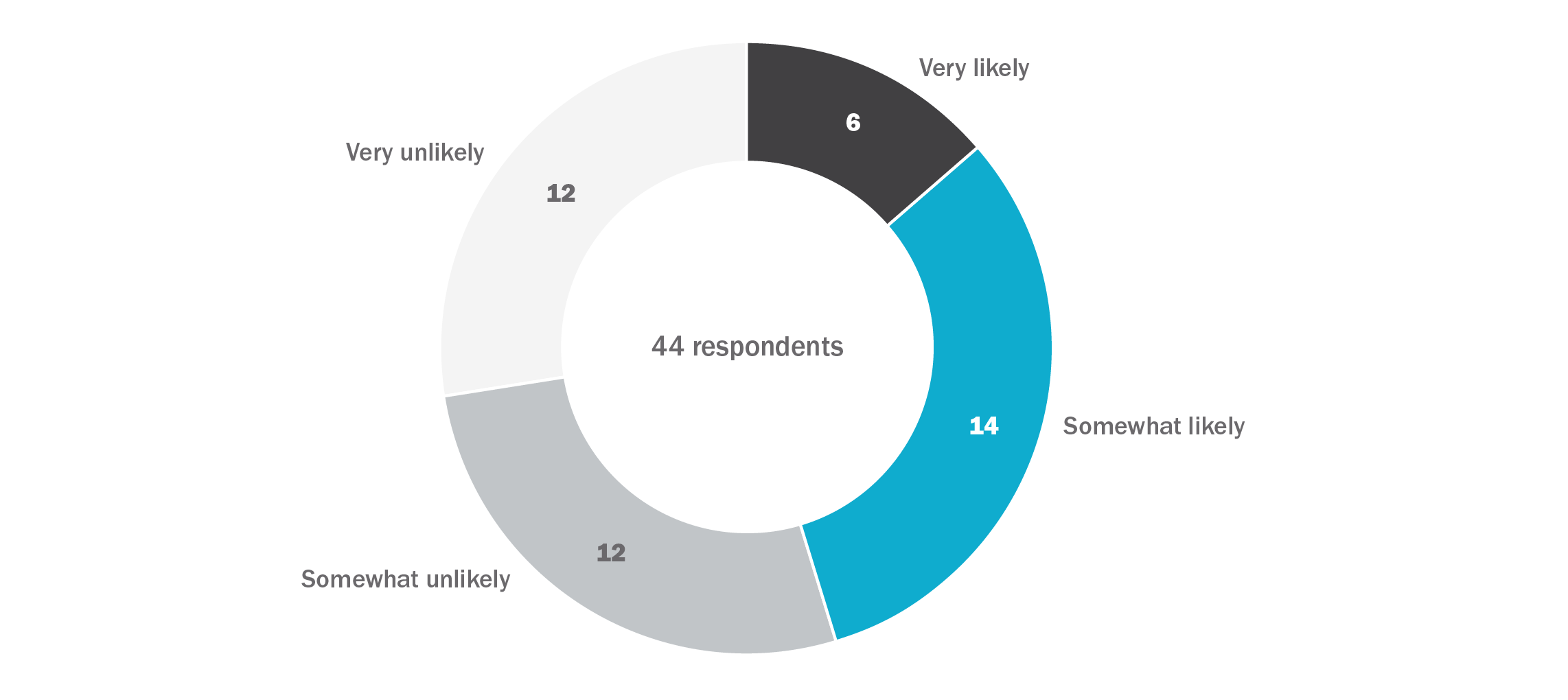
Putting aside how experts who responded to our survey thought the United States would respond, they were also divided as to how the United States should respond to an attack on Taiwan, assuming U.S. bases were not hit at the outset. Seven respondents, amounting to about 15 percent of the sample, said the United States should stay out of the conflict entirely, offering no military support. The rest were almost evenly divided between those who wanted the United States to send military forces to support Taiwan directly and those who wanted the United States to offer military assistance but no troops.
While those who support sending troops were most numerous, together the “no intervention” and the “assistance without forces” groups make up more than half of the respondents. In other words, those experts who do not think the United States should send forces to defend Taiwan outnumber those who think it should.
This limited support for directly defending Taiwan is notable given how much attention the possibility of a U.S. war with China over Taiwan receives. The Pentagon bases its military requirements and spends significant time planning and training for a possible future conflict with China. Defending Taiwan is the rationale for billions of dollars in military spending. Holding back China’s military force so it cannot take over Taiwan is one of the motivations behind punishing export controls and State Department approval of arms sales to Taiwan. The results of this survey raise the question of whether this massive investment of resources and the risks that a forward-leaning posture incur accurately reflect U.S. strategic interests.
Preferred U.S. response to an invasion of Taiwan if U.S. bases aren’t attacked
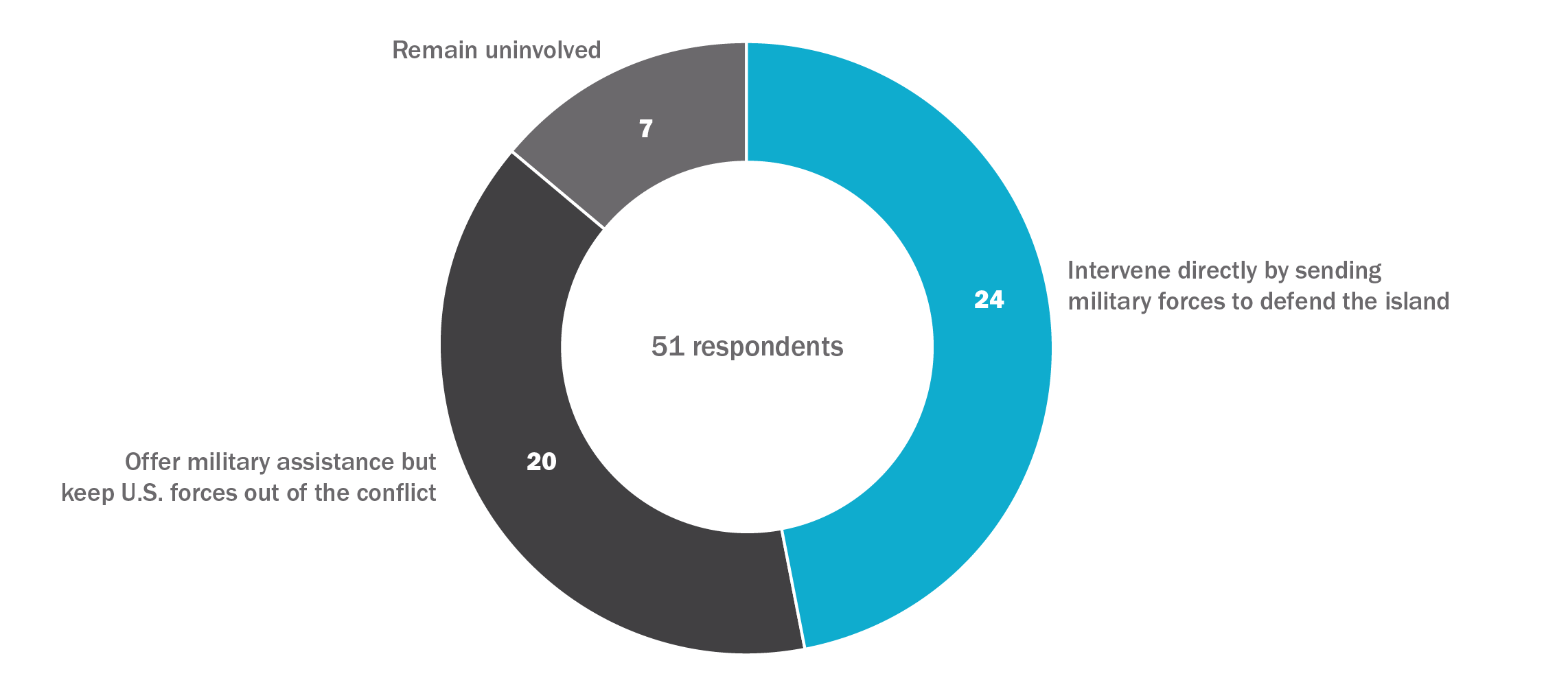
To explore why respondents hold the views they do, we next asked a series of questions about the military and economic benefits to China of successfully seizing Taiwan. The conventional wisdom in Washington has long been that if China were to successfully take over Taiwan, the benefits to Beijing would be high and the consequences for the United States and its ability to maintain its military and economic power in Asia substantial.12Susan M. Gordon, Michael G. Mullen, and David Sacks, “U.S.-Taiwan Relations in a New Era,” Task Force Report no. 81, Council on Foreign Relations, updated June 2023, https://www.cfr.org/task-force-report/us-taiwan-relations-in-a-new-era; Brendan Rittenhouse Green and Caitlin Talmadge, “Then What? Assessing the Military Implications of Chinese Control of Taiwan,” International Security 47, no. 1 (Summer 2022), 7–45, https://www.belfercenter.org/publication/then-what-assessing-military-implications-chinese-control-taiwan; Jonathan D. Caverley, “So What? Reassessing the Military Implications of Chinese Control of Taiwan,” Texas National Security Review 8, no. 3 (Summer 2025): 28–53, https://tnsr.org/2025/06/so-what-reassessing-the-military-implications-of-chinese-control-of-taiwan/; Mike Sweeney, “How militarily useful would Taiwan be to China?” Defense Priorities, April 12, 2022, https://www.defensepriorities.org/explainers/how-militarily-useful-would-taiwan-be-to-china/. Our experts disagreed.
Likelihood of a successful Chinese invasion of Taiwan if the U.S. sends troops but no nuclear weapons are used
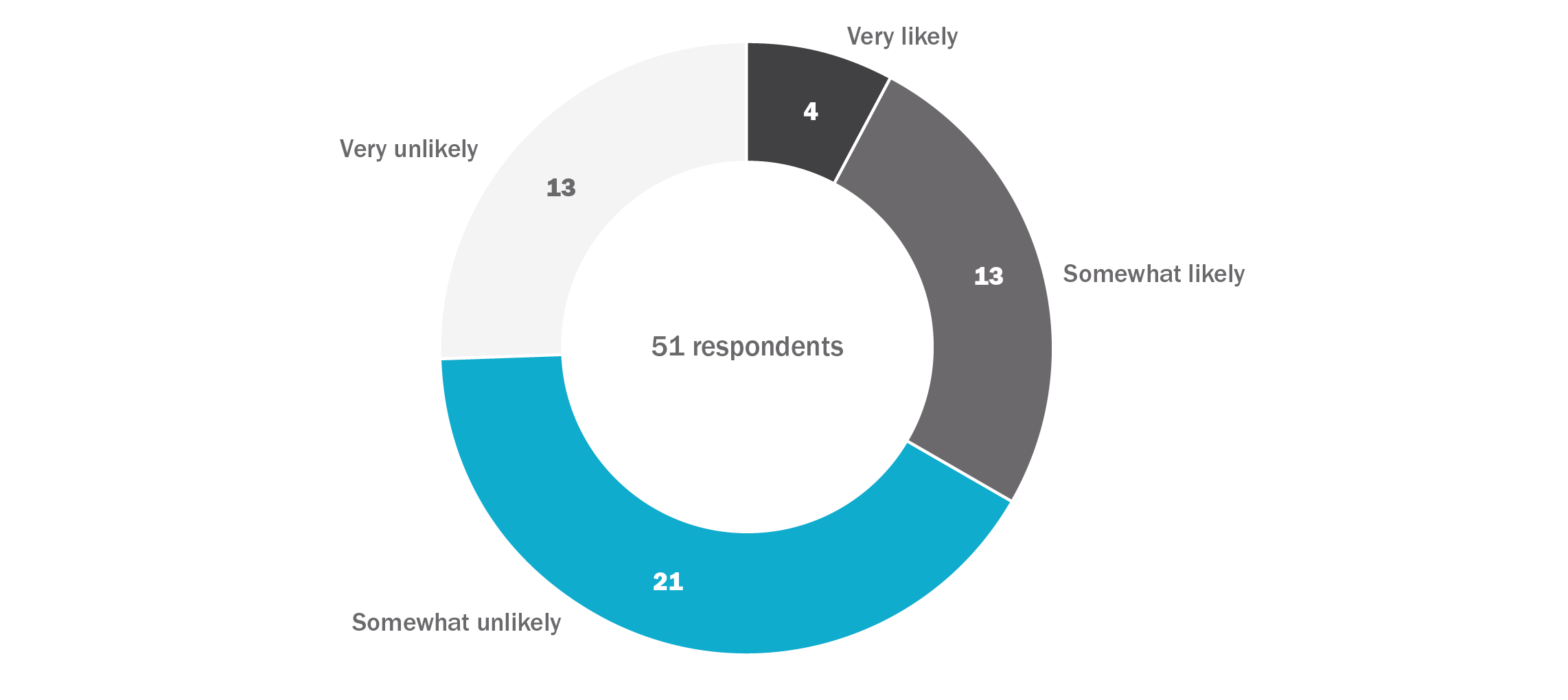
For starters, the experts who responded to our survey are relatively confident that a Chinese intervention would fail to accomplish its goal, that is unification of the mainland and Taiwan. About two-thirds reported they thought it unlikely or very unlikely that an invasion would achieve its desired outcome. Such skepticism spans those who see a U.S. intervention as likely (about two-thirds doubt China will succeed) and those who see it as unlikely (about half doubt China’s prospects). In other words, experts who responded to our survey are doubtful about Chinese prospects almost irrespective of what the United States does.
Experts were more divided over what China would gain if it were able to successfully seize Taiwan. Over two-thirds of the full sample and half of those who supported sending troops to defend Taiwan expected that China would gain low to moderate military advantages from controlling the island. Similarly, almost 80 percent of the full sample reported that the economic benefits to China from controlling Taiwan would be low to moderate.
Overall, experts who responded to our survey are underwhelmed by the benefits they expect China would accrue even if it did succeed in using military means to conquer the island. This diverges from the popular narrative that China’s successful takeover of Taiwan would shift the balance of power and tilt the region against the United States.
Benefits to China were it to seize Taiwan

If the gains to China from successfully seizing Taiwan would be moderate at best, as survey respondents seem to think, it raises questions about why they would see a U.S. intervention as necessary in any form, whether with military forces or security assistance only, as was the case for most of our survey respondents. After all, a war that pits the United States against China could have devastating consequences.13Cancian, Cancian, and Heginbotham, “The First Battle of the Next War”; Kavanagh and Wertheim, “The Taiwan Fixation.” The costs to the United States would be immense in terms of dollars and lives, and the global economic disruption would be severe.14Jennifer Welch et al, “Xi, Biden, and the $10 Trillion Cost of the War in Taiwan,” Bloomberg, January 9, 2024, https://www.bloomberg.com/news/features/2024-01-09/if-china-invades-taiwan-it-would-cost-world-economy-10-trillion. The worst case scenario is escalation to a nuclear war that would decimate the Indo-Pacific region, the combatants, and even the globe.15Cancian, Cancian, and Heginbotham, “Wargaming Nuclear Deterrence and Its Failures in a U.S.-China Conflict Over Taiwan,” Center for Strategic and International Studies, December 13, 2024, https://www.csis.org/analysis/confronting-armageddon; James H. Anderson, “The Next Taiwan Crisis Will (Almost) Certainly Involve Nuclear Threats,” Proceedings 150, no. 3 (March 2024), https://www.usni.org/magazines/proceedings/2024/march/next-taiwan-crisis-will-almost-certainly-involve-nuclear-threats. If China is unlikely to gain much from such an operation, why take the risk?
Our expert respondents were certainly aware of the high costs of a possible war with China over Taiwan but did not seem to buy into the most severe estimates or doomsday predictions. Though U.S. military leaders have expressed growing concerns about a war over Taiwan becoming protracted, especially after watching the war in Ukraine drag on for over three years, experts who responded to our survey are less concerned. Over half expect that a war over Taiwan would come to an end in under a year. Since they also expect China’s intervention to fail, this suggests they anticipate a rather rapid Chinese failure (and a U.S. success if the United States chooses to get involved).
Expected length of a war between the U.S. and China over Taiwan

If the United States did send military forces to support Taiwan’s defense, a short war would not prevent U.S. fatalities in our respondents’ view. Experts were split between those who expected the United States would suffer fatalities in the thousands and those who believed they would number in the tens of thousands. Though the reality is unknowable in advance, if the conflict unfolds as many wargames and military leaders expect, it is hard to imagine fatalities being any lower than 10,000. As U.S. Admiral Scott Swift has said, the “price of entry” into a Taiwan conflict is likely two aircraft carriers, amounting to about 10,000 U.S. deaths.16“Will Beijing Invade Taiwan?” ChinaFile, July 30, 2021, https://www.chinafile.com/conversation/will-beijing-invade-taiwan.
Estimated U.S. military fatalities in a war between the U.S. and China over Taiwan
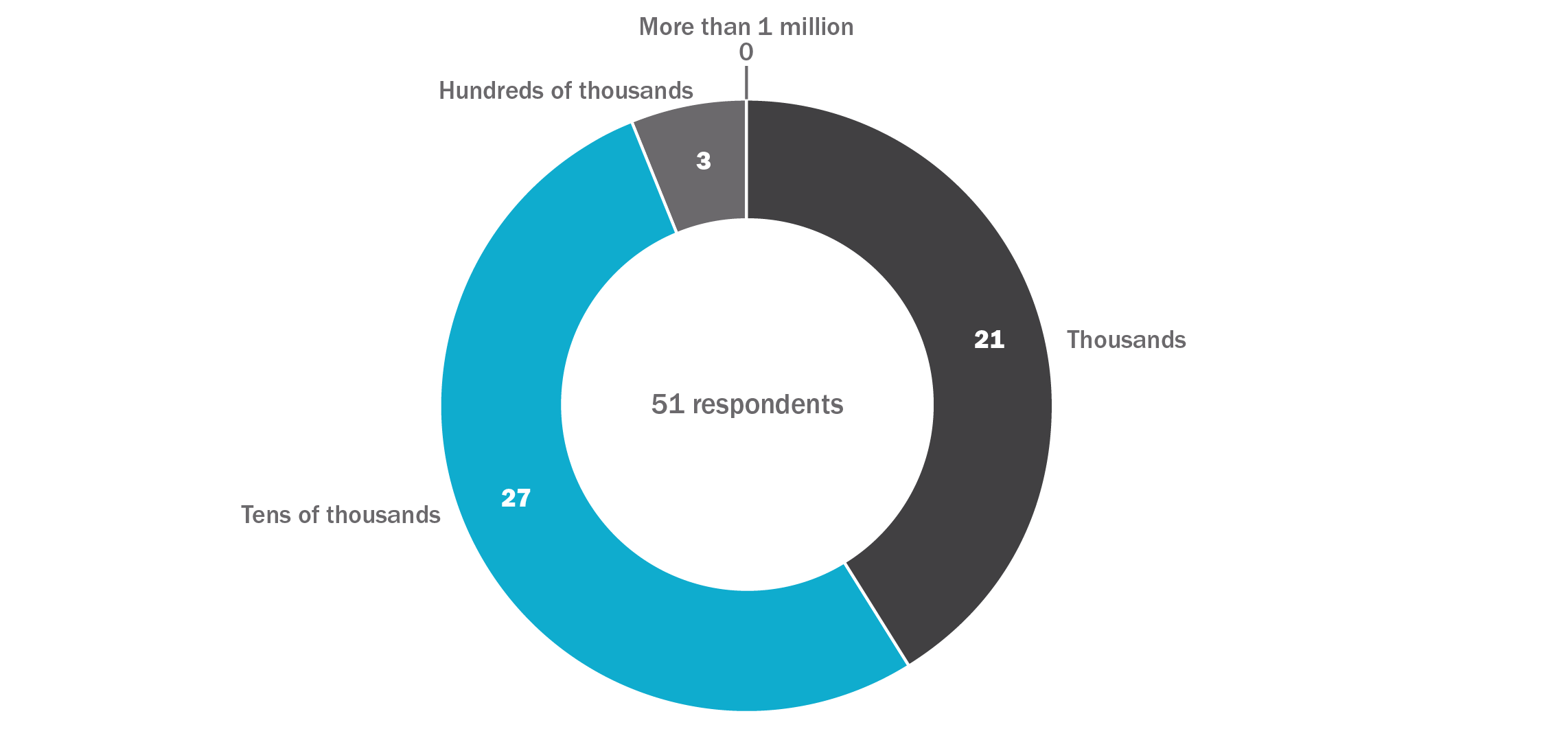
Experts in our survey did express concern over the risk of nuclear use if the United States joined the conflict directly but they didn’t think it likely. About 85 percent of respondents said the use of strategic nuclear weapons was unlikely or very unlikely and 70 percent reported the same about the use of tactical nuclear weapons. Given the frequency with which nuclear weapons use is raised as a risk of great power war, this is surprising but perhaps reassuring.
Likelihood of nuclear weapon use in a war between the U.S. and China over Taiwan

Still, with high costs to the United States and seemingly low benefits and low chances of success for China, why would U.S. experts expect or even support U.S. involvement? Why not simply stay uninvolved?
Expert responses to our remaining survey questions offer some insight into this puzzle. First, some explanations can be ruled out. Our experts do not think public opinion will push policymakers to intervene with about half of them predicting this pressure would be moderate or even lower. This is consistent with most work studying public attitudes on foreign policy—the general public tends to be only weakly engaged on these questions, giving policymakers flexibility.17Adam J. Berinsky, In Time of War: Understanding American Public Opinion from World War II to Iraq (Chicago: University of Chicago Press, 2009), https://press.uchicago.edu/ucp/books/book/chicago/I/bo5514391.html.
On the other hand, almost two-thirds of the experts in our survey sample anticipated high or very high pressure from Congress for a direct military intervention. Ultimately, it would be up to the president to send military forces to support Taiwan, but even powerful executives are dependent on congressional support to push their agendas forward. The attitudes of Congress and their lobbying of the president could end up influencing executive branch decisions.
Political pressure on an American president

Experts do not seem overly concerned that a U.S. choice to remain uninvolved in a war over Taiwan would destroy the American alliance system or lead current allies to bandwagon with China. Two-thirds of respondents expected that allies like Japan and the Philippines would instead choose to balance Chinese power by doubling down on their relationship with the United States and their own defense investments. An even greater portion, about 85 percent, see only a low to moderate risk that allies would bandwagon with China.
Likely reaction from U.S. allies if China conquers Taiwan

What our experts are concerned about is how a successful Chinese takeover of Taiwan would affect U.S. military power in Asia. About two-thirds of all respondents and 80 percent of those who support the use of U.S. military force to defend Taiwan see preventing any change to the regional status quo—including any successful unification of Taiwan and China—as of high or very high importance to the U.S. military position in the region. This result is specific to military power and does not cover economic influence. Only about half of expert respondents say a change from the current cross-strait status quo is likely to have serious economic effects for the United States.
Importance to the U.S. of maintaining the status quo in China-Taiwan relations

This result is an awkward fit with other parts of the survey. Experts fear the implications for U.S. regional hegemony of a successful Chinese takeover of Taiwan—so much that this alone seems to be enough to drive their support for a costly and risky U.S. intervention—even though they expect China will have low odds of success and would accrue at best moderate military and economic benefits if it were successful. This is the case even though those same experts cannot identify how this would reconfigure the region or lead to shifts in the regional power balance. One possible explanation is that it represents an attachment to what remains of U.S. military dominance in the region.
This is backed up by experts’ identifying the most important reasons the United States should or should not send military forces to defend the island. Among the most common reasons cited by our experts was the protection of U.S. hegemony, or at least the prevention of Chinese regional dominance. Though some pointed to the importance of defending U.S. allies or upholding democratic norms, an overwhelming number—including those who support direct intervention with military forces and those who prefer a military assistance response—believe the strongest argument for a U.S. intervention is that the loss of Taiwan to China would deal a death blow to U.S. military dominance in the region.
Still, even for those who are fearful of this consequence, there are concerns about the costs of U.S. engagement in such a war—economic, in U.S. lives, and of possible nuclear use. In their written responses, experts revealed their struggles to weigh these costs against what they see as the strategic consequences for the United States should Taiwan fall to China.
Many respondents acknowledged that the costs of defending Taiwan are rising and the U.S. interests at stake are not existential.18“To Consider the Nomination of Mr. Elbridge A. Colby to be Under Secretary of Defense for Policy,” Senate Committee on Armed Services, 119th Congress, March 4, 2025, https://www.armed-services.senate.gov/imo/media/doc/30425fulltranscript.pdf. For some, the answer is clear—the benefits are too low and the costs too high to entertain any type of U.S. military intervention. Others decided an intervention would be justified but acknowledge the decision is not a clear cut one, that the costs are likely to be quite high and the benefits of even a successful U.S. defense of the island limited or short-lived. Maintaining the status quo of U.S. dominance in the region is important, a large number of experts seemed to suggest, but not at any price.
So what does it all mean?
The results of our expert survey suggest four key takeaways. First, as noted previously, strategic ambiguity appears to be working—despite a hollowing out of this policy under the Biden administration.19Kavanagh and Wertheim, “The Taiwan Fixation.” If even U.S. experts are not sure how Washington would respond, then those outside the United States cannot be certain. This should shape how all actors think about and prepare for a possible conflict over Taiwan. For Taiwan, the lack of certainty is a reminder that it cannot count on direct U.S. support in the event of a Chinese attack. Instead, Taiwan should be building its own self-sufficient defense capable of deterring a Chinese invasion and denying China its objectives if deterrence fails.
For Chinese leaders, the lack of certainty about the U.S. response to a potential invasion of Taiwan should, at the very least, cause them to think twice before preemptively striking U.S. military bases in the region. Striking U.S. forces would eliminate any chance of the United States staying out of the conflict. Of course, not striking U.S. bases immediately would leave open the risk that the United States could intervene later, so Beijing would weigh the pros and cons carefully.
Second, experts who responded to our survey were skeptical that China could successfully seize Taiwan and of the benefits it would accrue if it did so. This departs from conventional wisdom and the long-time narrative in Washington, DC that Taiwan is a “critical node” that would give China significant military and economic advantages in the region.20“Statement by Dr. Eli Ratner, Assistant Secretary of Defense for Indo-Pacific Security Affairs,” Senate Committee on Foreign Relations, 117th Congress, December 8, 2021, https://www.foreign.senate.gov/imo/media/doc/120821_Ratner_Testimony1.pdf. Combined with their assessment that China was not all that likely to strike U.S. bases preemptively, our experts seem to think the United States has room for discretion. U.S. policymakers need not feel forced into a war over Taiwan—the stakes may be lower than many believe and decisionmakers should have time to consider options before launching into the use of military force.
Third, our survey results show the continuing allure of U.S. military primacy. Our experts believe the biggest risk of not defending Taiwan would be the end of U.S. military dominance in East Asia and the beginning of Chinese regional military supremacy. For many, this is enough to warrant what would be a catastrophic and possibly nuclear conflict. It seems possible this attachment to the military status quo is little more than the lingering shadow of U.S. primacy and the fear that military retrenchment anywhere will lead to a collapse of U.S. power and influence everywhere.
Finally, experts who responded to our survey were not ignorant of the tremendous costs that would be associated with a war over Taiwan. For many, these costs were high enough to rule out a U.S. military intervention. Others expressed uncertainty. They acknowledged the costs might be too high but lacked sufficient information to make a determination. The reality is that there is a real deficit of good information about the costs and risks of U.S. involvement in a war over Taiwan. The global economic consequences have been assessed, but not the full military costs, including the loss of servicemembers and hardware. The risks of escalation to use of nuclear weapons are often referenced but few grapple with what a major war between nuclear powers would really mean. More work is needed in this area.
Ultimately, our survey makes clear that how decisionmakers think about the costs of a war in Taiwan will be an important and even decisive factor should there be a cross-strait crisis. Experts can help them avoid a catastrophic mistake by fully mapping out these costs in ways they and the American public can clearly understand.
Appendix: Survey questions
- How would you assess the likelihood of a Chinese military invasion of Taiwan in the next five years? (Please select: very likely, somewhat likely, somewhat unlikely, or very unlikely.)
- If China launches a military invasion of Taiwan, how would you assess the likelihood that Beijing would preemptively strike U.S. bases in Japan? (Please select: very likely, somewhat likely, somewhat unlikely, or very unlikely.)
- If China launches a military invasion of Taiwan, how would you assess the likelihood that Beijing preemptively strikes U.S. bases in Guam? (Please select: very likely, somewhat likely, somewhat unlikely, or very unlikely.)
- If China launches a military invasion of Taiwan and does not strike U.S. targets at the outset, how would you assess the likelihood that the United States stays entirely uninvolved, offering no military support of any kind? (Please select: very likely, somewhat likely, somewhat unlikely, or very unlikely.)
- If China launches a military invasion of Taiwan and does not strike U.S. targets at the outset, how would you assess the likelihood that the United States offers military assistance in the form of weapons but not does not send troops, as it has done in Ukraine? (Please select: very likely, somewhat likely, somewhat unlikely, or very unlikely.)
- If China launches a military invasion of Taiwan and does not strike U.S. targets at the outset, how would you assess the likelihood that the United States supports Taiwan directly by sending U.S. military forces to defend the island? (Please select: very likely, somewhat likely, somewhat unlikely, or very unlikely.)
- If China launches a military invasion of Taiwan and does not strike U.S. targets at the outset, how would you assess the political pressure from the general public that an American president would face to send U.S. forces to defend the island? (Please select: very low, low, moderate, high, or very high.)
- If China launches a military invasion of Taiwan and does not strike U.S. targets at the outset, how would you assess the political pressure from Congress that an American president would face to send U.S. forces to defend the island? (Please select: very low, low, moderate, high, or very high.)
- If China launches a military invasion of Taiwan and the United States sends military forces to defend the island, how would you assess the likelihood that U.S. regional allies contribute troops to fight alongside U.S. forces? (Please select: very likely, somewhat likely, somewhat unlikely, or very unlikely.)
a. Please specify which allies you think are very or somewhat likely to contribute troops. - If China launches a military invasion of Taiwan and does not strike U.S. targets at the outset, how do you think the U.S. should respond? (Please select: offer military assistance but keep U.S. forces out of the conflict, intervene directly by sending military forces to defend the island, or remain uninvolved.)
- If China launches a military invasion of Taiwan and the United States sends military forces to defend Taiwan, how would you assess the likelihood that China achieves its objective of seizing Taiwan, assuming no nuclear weapons were used? (Please select: very likely, somewhat likely, somewhat unlikely, or very unlikely.)
- If China launches a military invasion of Taiwan and the United States sends military forces to defend Taiwan, how long do you expect the conflict to last before one side achieves its objectives or a settlement is reached? (Please select: less than one month, 1–6 months, 6–12 months, 1–3 years, or more than 3 years.)
- If China launches a military invasion of Taiwan and the United States sends military forces to defend the island, what is your best estimate of the total U.S. military fatalities (as a reference point, U.S. fatalities in Vietnam were 58,000 and U.S. fatalities in World War II were 400,000)? (Please select: thousands, tens of thousands, hundreds of thousands, or more than 1 million.)
- If China launches a military invasion of Taiwan and the United States sends military forces to defend the island, how would you assess the likelihood that tactical nuclear weapons are used by either the United States or China? (Please select: very likely, somewhat likely, somewhat unlikely, or very unlikely.)
- If China launches a military invasion of Taiwan and the United States sends military forces to defend the island, how would you assess the likelihood that strategic nuclear weapons are used by either the United States or China? (Please select: very likely, somewhat likely, somewhat unlikely, or very unlikely.)
- How would you assess the military benefits China would gain were it to seize Taiwan? (Please select: very low, low, moderate, high, or very high.)
- How would you assess the economic benefits China would gain were it to seize Taiwan? (Please select: very low, low, moderate, high, or very high.)
- How would you assess the importance of maintaining the status quo in China-Taiwan relations to U.S. military power in Asia? (Please select: very low, low, moderate, high, or very high.)
- How would you assess the importance of maintaining the status quo in China-Taiwan relations to U.S. economic growth? (Please select: very low, low, moderate, high, or very high.)
- If China launches a military invasion of Taiwan, the United States stays uninvolved, and China succeeds in seizing the island, how would you assess the likelihood that U.S. allies move away from the United States and bandwagon with China? (Please select: very low, low, moderate, high, or very high.)
- If China decides to launch a military invasion of Taiwan, the United States stays uninvolved, and China succeeds in seizing the island, how would you assess the likelihood that U.S. allies lean toward and balance with the United States? (Please select: very low, low, moderate, high, or very high.)
- The most important reason the United States should use military force to prevent China from seizing Taiwan is: (fill in your answer).
- The most important reason the United States should not use military force to prevent China from seizing Taiwan is: (fill in your answer).
- Please specify your age range.
- Please specify your military experience.
Endnotes
- 1“Strategic Ambiguity Toward Taiwan,” Council on Foreign Relations, June 8, 2022, https://education.cfr.org/teach/mini-simulation/strategic-ambiguity-toward-taiwan.
- 2Terri Moon Cronk, “Testimony: DOD Is Laser Focused on China Pacing Challenge, Meeting Our Commitments Under the Taiwan Relations Act,” DOD News, U.S. Department of Defense, December 8, 2021, https://www.defense.gov/News/News-Stories/Article/Article/2867003/testimony-dod-is-laser-focused-on-china-pacing-challenge-meeting-our-commitment/.
- 3“Remarks by Secretary of Defense Pete Hegseth at the 2025 Shangri-La Dialogue in Singapore (As Delivered),” U.S. Department of Defense, May 31, 2025, https://www.defense.gov/News/Speeches/Speech/Article/4202494/remarks-by-secretary-of-defense-pete-hegseth-at-the-2025-shangri-la-dialogue-in/.
- 4Christian von Soest, “Why Do We Speak to Experts? Reviving the Strength of the Expert Interview Method,” in Perspectives on Politics, eds. Ana Arjona and Wendy Pearlman (Cambridge: Cambridge University Press, 2023), vol. 21: 277–287, https://www.cambridge.org/core/journals/perspectives-on-politics/article/why-do-we-speak-to-experts-reviving-the-strength-of-the-expert-interview-method/45E710F27CEC6E739B015E10A161E140.
- 5Kinga Edwards, “What is a Good Response Rate for a Survey?” SurveyLab, June 6, 2025, https://www.surveylab.com/blog/what-is-a-good-response-rate-for-a-survey/.
- 6Noah Robertson, “How DC became obsessed with a potential 2027 Chinese invasion of Taiwan,” Defense News, May 7, 2024, https://www.defensenews.com/pentagon/2024/05/07/how-dc-became-obsessed-with-a-potential-2027-chinese-invasion-of-taiwan/.
- 7Audrey Decker, “Air Force general defends incendiary memo but says ‘war is not inevitable,’” Defense One, September 20, 2023, https://www.defenseone.com/threats/2023/09/air-force-general-defends-incendiary-memo-says-war-not-inevitable/390467/.
- 8The most prominent recent example is Mark F. Cancian, Matthew Cancian, and Eric Heginbotham, “The First Battle of the Next War: Wargaming a Chinese Invasion of Taiwan,” Center for Strategic and International Studies, January 9, 2023,
https://www.csis.org/analysis/first-battle-next-war-wargaming-chinese-invasion-taiwan; see also Stacie Pettyjohn, Becca Wasser, and Chris Dougherty, “Dangerous Straits: Wargaming a Future Conflict Over Taiwan,” Center for a New American Security, June 15, 2022, https://www.cnas.org/publications/reports/dangerous-straits-wargaming-a-future-conflict-over-taiwans. - 9Jennifer Kavanagh and Stephen Wertheim, “The Taiwan Fixation,” Foreign Affairs, September/October 2025, https://www.foreignaffairs.com/taiwan/taiwan-fixation-kavanagh-wertheim.
- 10Austyn Sutton, “The United States Needs Japan in a Fight for Taiwan,” Proceedings 150, no. 10 (October 2024), https://www.usni.org/magazines/proceedings/2024/october/united-states-needs-japan-fight-taiwan.
- 11Evan A. Feigenbaum, “Beneath the Mateship, a Quiet Crisis Is Brewing in the U.S.-Australia Alliance,” Carnegie Endowment for International Peace, June 23, 2025, https://carnegieendowment.org/posts/2025/06/us-australia-alliance-quiet-crisis?lang=en.
- 12Susan M. Gordon, Michael G. Mullen, and David Sacks, “U.S.-Taiwan Relations in a New Era,” Task Force Report no. 81, Council on Foreign Relations, updated June 2023, https://www.cfr.org/task-force-report/us-taiwan-relations-in-a-new-era; Brendan Rittenhouse Green and Caitlin Talmadge, “Then What? Assessing the Military Implications of Chinese Control of Taiwan,” International Security 47, no. 1 (Summer 2022), 7–45, https://www.belfercenter.org/publication/then-what-assessing-military-implications-chinese-control-taiwan; Jonathan D. Caverley, “So What? Reassessing the Military Implications of Chinese Control of Taiwan,” Texas National Security Review 8, no. 3 (Summer 2025): 28–53, https://tnsr.org/2025/06/so-what-reassessing-the-military-implications-of-chinese-control-of-taiwan/; Mike Sweeney, “How militarily useful would Taiwan be to China?” Defense Priorities, April 12, 2022, https://www.defensepriorities.org/explainers/how-militarily-useful-would-taiwan-be-to-china/.
- 13Cancian, Cancian, and Heginbotham, “The First Battle of the Next War”; Kavanagh and Wertheim, “The Taiwan Fixation.”
- 14Jennifer Welch et al, “Xi, Biden, and the $10 Trillion Cost of the War in Taiwan,” Bloomberg, January 9, 2024, https://www.bloomberg.com/news/features/2024-01-09/if-china-invades-taiwan-it-would-cost-world-economy-10-trillion.
- 15Cancian, Cancian, and Heginbotham, “Wargaming Nuclear Deterrence and Its Failures in a U.S.-China Conflict Over Taiwan,” Center for Strategic and International Studies, December 13, 2024, https://www.csis.org/analysis/confronting-armageddon; James H. Anderson, “The Next Taiwan Crisis Will (Almost) Certainly Involve Nuclear Threats,” Proceedings 150, no. 3 (March 2024), https://www.usni.org/magazines/proceedings/2024/march/next-taiwan-crisis-will-almost-certainly-involve-nuclear-threats.
- 16“Will Beijing Invade Taiwan?” ChinaFile, July 30, 2021, https://www.chinafile.com/conversation/will-beijing-invade-taiwan.
- 17Adam J. Berinsky, In Time of War: Understanding American Public Opinion from World War II to Iraq (Chicago: University of Chicago Press, 2009), https://press.uchicago.edu/ucp/books/book/chicago/I/bo5514391.html.
- 18“To Consider the Nomination of Mr. Elbridge A. Colby to be Under Secretary of Defense for Policy,” Senate Committee on Armed Services, 119th Congress, March 4, 2025, https://www.armed-services.senate.gov/imo/media/doc/30425fulltranscript.pdf.
- 19Kavanagh and Wertheim, “The Taiwan Fixation.”
- 20“Statement by Dr. Eli Ratner, Assistant Secretary of Defense for Indo-Pacific Security Affairs,” Senate Committee on Foreign Relations, 117th Congress, December 8, 2021, https://www.foreign.senate.gov/imo/media/doc/120821_Ratner_Testimony1.pdf.

